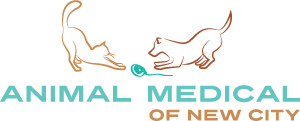Our regular clients have heard us discuss the importance of regular dentistry for our pets many times, but with National Pet Dental Health Month coming up in February, we thought we would share this interview that Dr. Howard Gittelman did for the national industry publication, Veterinary Medicine 360.
VM 360: Dr. Gittelman, how important is dentistry for our pets?

DR G: The question might better be phrased, ‘how important is dental health for our pets?’ In which case I would reply, very. Let’s just look at what we know to be factual. Pets with moderate to severe dental disease are in pain. They have active infections going on in their mouths and those bacteria are leaching into their blood stream making them feel less-than-a-okay. How badly those pets feel, I cannot say, but I will tell you that sometimes our clients report a marked increase in their pet’s attitude and appetite once we clean up oral infections through dentistry. Lastly, we know from research that patients with dental disease are experiencing microscopic negative changes to their liver and kidneys. So if you ask me, is dentistry important, I would say, yes, if that’s what it’s going to take to get the dog or cat’s mouth healthy, but I guess I would first advocate for a dental health program for your pet when its still a puppy or kitten that would include oral treats, oral rinses, oral diets and/or brushing.
VM360: How do you do clean a pet’s teeth?
DR. G: The same way we get our teeth cleaned when we go to the dentist, with an ultrasonic scaler. Plaque and tarter build up on pet’s teeth simply cannot be removed with brushing. Moreover, we are targeting the build up underneath the gums, not just what you can see when you lift up the pet’s mouth. That’s the build up that’s compromising the gum line and allowing for infection.
VM360: Why do I have to put my pet ‘under’ for a dental?
DR G: Veterinary dentistry requires anesthesia. This reduces the stress for the patient, protects them from inhaling the water and germs released during the dentistry, allows us to get to that all important below-the-gumline target area, and allows us to do a thorough job in cleaning the entire surface area of the tooth. Any one who offers to do a dental on a patient without anesthesia is not doing the job correctly.
VM360: Are there risks involved?
DR G: Again, I would like to look at this question in a different way. As a pet ages, the the risk of detrimental effects, both direct and indirect, from dental disease also increase. As a pet owner you could wait till your pet has the worst mouth possible before you do the dentistry, but at this stage, the patient is mostly likely much older, in some kind of compromised health and will require a much more involved dental procedure probably involving oral surgery. Or you could do the dental preventatively in which case the length and invasiveness of the procedure is minimal. In both cases, we incur unavoidable risks, mostly due to the anesthesia, but when a client opts for preventative dentistry for their pet they minimize risk. I should also mention that we employ the very highest in anesthetic standards as prescribed by the American Board of Veterinary Dentistry, the American Animal Hospital Association and the American Veterinary Medical Association.
VM360: What about costs?
DR G: An excellent question and an important one. Why should our clients spend money for something that hasn’t gone wrong yet? And the answer is because the changes that occur in a patient’s mouth do to oral disease are irreversible and debilitating. The bacteria that’s causing the odor you smell when you give your pet a kiss or it licks you is eating away at the very bone holding the teeth into the jaw. It causes loose teeth, severe infection and pain. Once a mouth gets to that stage, all I can do is pull bad teeth and clean whatever healthy teeth are left, the damage to the underlying bone remains.
VM360: Anything else you would like to add.
DR G: Only this. Our patients are incredibly important to. The clients that have been coming to us these many years know this to be true. It is simply beyond our ability to make a recommendation that we cannot stand behind 1000 percent. As veterinary professionals, we have weighed the benefits of preventative care over dental disease and unequivocally agree that preventative care is best. This is true whether you evaluate risk, cost or quality of life.
